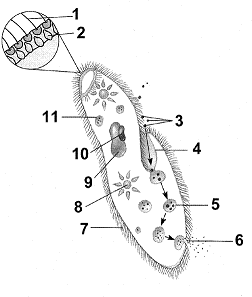What do the Gram stain, the acid-fast stain, and the endospore stain have in common?
A. The staining outcome varies with the charge of the cell wall.
B. They use a negative stain technique.
C. They are used on a wet mount of the specimen.
D. They are differential stains.
E. They use heat to force the dye into cell structures.
Answer: D
You might also like to view...
A deficiency in which vitamin or mineral can lead to an increased risk of neural tube defects?
a. Calcium b. Iodine c. Alcohol d. Folate e. Sodium
A respiratory surface is indicated by
a. A. b. B. c. C. d. D. e. E.
Refer to Figure 26-1. The function of the structure labeled 6 is:

a. food intake.
b. digestion.
c. waste elimination.
d. water discharge.
e. asexual reproduction
Gregor Mendel concluded that each pea has two units for each trait, and each gamete contains one unit. Mendel's "units" are now called
A) characters. B) chromosomes. C) transcription factors. D) genes.